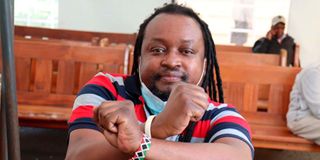Political satire is not criminal

Activist Edwin Mutemi Kiama when he appeared before the Milimani Law Court Nairobi on Wednesday, April 7, 2021. Kiama was arrested on suspicion of circulating posters on social media indicating that President Uhuru Kenyatta is not authorised to act or transact on behalf of Kenyans.
What you need to know:
- Satire is the laser beam that exposes politicians; warts and all.
- It has been used for centuries to mimic, ridicule, humourize and challenge the status quo.
Satire and politics are joined at the hip. Politicians just need to get over themselves and get used to the idea that as public figures they are fodder for cartoonists and satirical writers.
Satire goes with the territory. If you cannot take the heat, then do not enter the kitchen goes the saying. Politics is hot, dirty, and only the thick-skinned need to play the game.
Politicians who lament and react with impunity towards satire are taking the country backwards.
The 2010 Constitution has given the citizens litany of rights and one of those is the right to be able to enjoy freedom of expression and freedom of speech. Politicians believe they have the monopoly to exercise these rights and not the citizens. That is why they turn up to political rallies and call each other all sorts of unsavoury names under the sun because they have the right to, and they can as politicians.
Why should citizens be penalised for speaking their mind against their leader if they have grounds to do so? The end justifies the means even if citizens turn to cartoons to express their displeasure.
African leaders do not get mocked or even thought of being sick. Oh! No, no! A citizen who even harbours such thoughts is considered a traitor. The late President of Tanzania Dr John Magufuli’s recent ill health was not subject for discussion in his country. At least one person was allegedly arrested for suggesting President Magufuli was ill.
Dictators' weakness
African leaders’ sickness is always top government secret. A decision that is not only ridiculous but one that foolishly fights against nature. Illness befalls every human being, including presidents. Denial of a President’s illness highlights the insecurity in many of the African leaders who come to power through rigging and bloodshed.
Admitting sickness is admitting defeat to their opponents. However, many do not seem to think beyond the illness to the finality of death. Neither do they ponder that perhaps they owe it to their voters and the country’s stability to be honest and open with their illnesses. Only a bona fide leader could admit being sick as their conscious gives them the confidence to do so. Those that are power hungry will latch on their last breath to cling to power.
Just like illness, satire exposes the weaknesses of the dictators that they wish to ignore. Clamping down on cartoonist and satirical writers is not random or the work of sycophants alone per se but just a way of preserving a façade by showing up the leader in better lights, however, rotten he or she is inside.
Satire is the laser beam that exposes politicians; warts and all. It has been used for centuries to mimic, ridicule, humourize and challenge the status quo. A wise leader would look at satire positively. In a way it is just someone holding a mirror to the leader albeit through cartoons or satirical writings.
The latest attempt by Kenya to ask for yet another loan was met with protests from Kenyans to the IMF not to lend the country any more money. Twitter hashtag ‘stopgivingkenyansloans’ went vial and petition to the IMF garnered nearly 200,00 signatures. This was followed by cartoons and a satirical poster made using the President as the subject.
Curtailing freedoms
The whole saga snow-balled into a social media frenzy. KOT were on the offensive again and even got featured on the first page of UK’s Daily Mail newspaper and many other global media outlets carried the story.
A lot of it was sheer banter. On the other hand, it also offered the country food for thought. There were questions that we should all ask, such as whether we could indeed afford any more loans as a country or how we could recover after the current pandemic without having to borrow an extra shilling?
Arresting people for expressing their opinion on a matter that has direct impact on their lives is an overreaction. If I were the government, I would have used the opportunity to gauge the country’s fiscal prudence, use the chance to take stock and re-evaluate strategies used previously and find other ways of unburdening the country rather than piling on more loans on top of a rising mountain of debts. It is dictatorial to do so and downright irresponsible.
Using scare tactics to muzzle citizens’ voices when they raise concerns is counter-productive. The days of the ‘thought’ police are gone and hope they are never to return. Any attempt to criminalise freedom of speech or freedom of expression is an attempt to retrograde the gains made in the bill of rights. Criticism of politicians is to be expected. They can choose to take some with a pinch of salt and others seriously to improve on their leadership qualities.
Individual freedoms are the bedrock of a democracy. Curtailing freedoms is undermining the democratic processes. We can laugh at ourselves sometimes. Satire does not always have to be seen as necessary evil but as part of a political process.
Ms Guyo is a legal researcher. [email protected]. @kdiguyo





